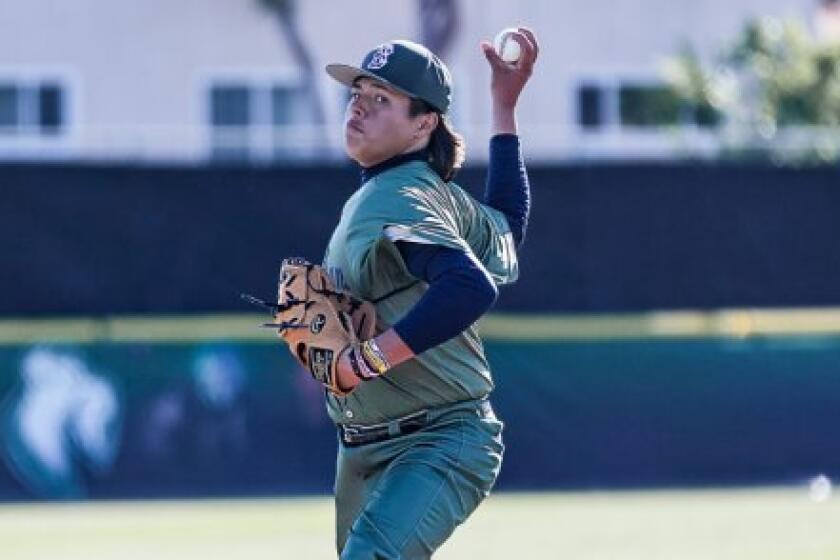It’s Not a Final NFL Draft Yet
- Share via
PALM BEACH, Fla. — In a development that could leave the football future of USC sophomore receiver Mike Williams in limbo, the NFL took a step Tuesday toward a possible reversal of last month’s landmark district-court ruling that opened the draft to anyone.
A three-judge panel of the U.S. 2nd Circuit Court of Appeals in New York scheduled an expedited hearing April 19 or 20 of the league’s appeal on the original order in the Maurice Clarett case. Clarett, a sophomore running back from Ohio State, sued for eligibility for the April 24-25 draft a year early. NFL rules stipulate that a player must be three years removed from high school to be eligible.
Because Clarett and Williams have hired agents, they are no longer eligible to play college football. If the court rules favorably on the NFL’s appeal, they -- along with seven other junior college and high school players who applied for early eligibility -- will be blocked from the draft.
“We think this is a very positive development,” NFL attorney Jeff Pash said Tuesday. “What the Clarett side had wanted was to get him through the draft and avoid, at all costs, having them put their arguments to the appeals court, giving the appeals court a chance to review this opinion. And now that will happen, which is what we wanted to happen.”
The appeals court will consider whether to put a stay into effect at that point, and whether to affirm or reverse the Feb. 5 order of U.S. District Judge Shira Scheindlin that declared Clarett eligible for the draft.
“It’s quite unusual for a court to impose such a quick schedule,” Pash said. “I think it’s an indication, along with the time they spent today, of the seriousness with which the court of appeals is taking this matter, and the seriousness with which they are considering the arguments we put to them as to why [the] district judge got this case wrong.”
Pash said there was a “very substantial chance” those players would not be in the draft.
Clarett’s lawyer, Alan Milstein, persuaded the appeals court not to stay the effect of the lower-court ruling Tuesday, saying such a ruling would cause NFL teams not to take his client as seriously before the draft.
“They did not issue a stay,” Milstein told Associated Press. “They set forth an expedited briefing schedule. Nothing happened today that was unexpected. The court is just doing what it needs to do to work hard and get Maurice in the draft -- and with plenty of time to do it.”
Milstein also rejected the NFL’s suggestion that Clarett would be unharmed if he was kept out of the draft by a stay, then permitted to enter a supplemental draft if the appeals court eventually ruled in Clarett’s favor. Milstein said Clarett would lose leverage to negotiate a contract, as well as practice time and time to learn his new team’s playbook, if he were not drafted in April.
Although nine players declared themselves eligible for early entry, only Williams and Clarett are believed to be on any team’s draft boards. Williams is a potential top-10 selection. Clarett probably would be chosen in the first three rounds.
Williams’ agent, Mike Azzarelli, did not return phone calls, but USC Coach Pete Carroll said he had advised Williams of such a development.
“We went to the league office to find out what could happen,” Carroll said. “The league office made us believe that this could likely happen and this was one of the issues that was just an uncertainty. And once you went past a certain point, there was no looking or turning back. This is exactly what we were talking about.”
In two seasons at USC, Williams, 20, established himself as one of the school’s greatest playmakers, helping quarterback Carson Palmer win the Heisman Trophy in 2002, and in 2003 leading the Trojans to a share of their first national title in 25 years.
If the appeals court were to rule in favor of the NFL and impose a stay, then later reverse that decision, the league has said it would conduct a supplemental draft for the underclassmen within 10 days of the court order.
Tulane law professor Gary Roberts, a leading antitrust specialist, said the decision of the appeals court to put the case on a fast track could indicate which way that court was leaning.
“One could argue that perhaps the 2nd Circuit is troubled by the district court’s opinion,” he said. “It might suggest the court is actually troubled by the opinion.”
Whichever side loses the next stage has the option to request a hearing before the full appeals court of 12 judges and/or submit it to the U.S. Supreme Court. It is unusual for either request to be granted, and certainly would not be granted in time for the draft.
Said Roberts, “Statistically, whoever loses at this point is behind the 8-ball.”
Times staff writer Gary Klein and Associated Press contributed to this report.
More to Read
Go beyond the scoreboard
Get the latest on L.A.'s teams in the daily Sports Report newsletter.
You may occasionally receive promotional content from the Los Angeles Times.











